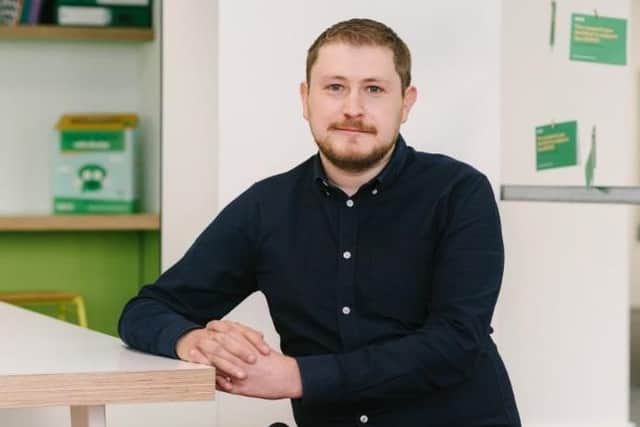New regulator to help keep our children safe online


Aptly announced on Safer Internet Day last Wednesday, the move will serve to better protect children and vulnerable people online.
Home Secretary Priti Patel said: “While the internet can be used to connect people and drive innovation, we know it can also be a hiding place for criminals, including paedophiles, to cause immense harm.
Advertisement
Hide AdAdvertisement
Hide Ad“It is incumbent on tech firms to balance issues of privacy and technological advances with child protection. That’s why it is right that we have a strong regulator to ensure social media firms fulfil their vital responsibility to vulnerable users.”


The news was welcomed by the National Society for the Prevention of Cruelty to Children, which started campaigning for better regulation of internet sites two years ago.
In 2018/19, Police Scotland recorded 581 crimes of communicating indecently with a child, which included online sexual communication.
And the number of recorded crimes increased by 35 per cent from the previous year.
Advertisement
Hide AdAdvertisement
Hide AdThrough its Wild West Web campaign, the NSPCC has been at the forefront of campaigning for better protection for children online since 2017.


Last summer, the charity revealed that one in 25 young people in the UK, aged from 11 to 17 years old, who used Facebook or Facebook Messenger had sent, received or been asked to send sexual content to an adult.
And with Facebook founder Mark Zuckerberg planning to allow encrypted messages, which he admitted would protect “the privacy of people doing bad things”, the NSPCC hopes the government will act quickly.
Peter Wanless, chief executive officer, said: “The government has signalled it is willing to stand up to Silicon Valley and commit to landmark British regulation that could set a global standard in protecting children online.
Advertisement
Hide AdAdvertisement
Hide Ad“For far too long the safety of children has been an inconvenience for social media companies who have left them exposed to harmful content, grooming and abuse.
“Tech giants will only do all that they should to stop groomers abusing children on their sites if the penalties for failure are game-changing.
“Ministers must now move urgently to get a proactive duty of care onto the statute books that gives Ofcom the powers to lift up the bonnet on social networks, impose hefty fines on rogue companies and hold named directors criminally accountable for putting children at risk.”
A survey of more than 4000 children and young people and 4000 parents and carers – conducted on behalf of O2 and NSPCC ahead of Safer Internet Day – revealed more than a quarter (27 per cent) of children and young people were worried about cyber-bullying – topping the list of online fears.
Advertisement
Hide AdAdvertisement
Hide AdBeing contacted by someone they didn’t know was the second biggest fear (16 per cent of respondents).
Some 89 per cent of youngsters thought talking to their parents would help keep them safe online, but parents reported that only 35 per cent had done so in the last 12 months.
While 92 per cent of parents and carers felt they knew how to advise their child on staying safe online, less than half (42 per cent) had agreed guidelines on using the internet.
It’s for this reason that the NSPCC and O2 have created a new online family agreement for parents and children to fill-in together to encourage more regular conversations about internet safety.
Advertisement
Hide AdAdvertisement
Hide AdThe agreement provides families with the opportunity to make a joint pledge on things both parents and children will do when online.
Andy Burrows, NSPCC head of child safety online policy, hopes the new tool will stimulate greater debate about social media at the kitchen table.
He said: “We’re expecting children to make split second decisions about who they talk to online, particularly when they’re live streaming.
“Sites have not been designed to take account of these risks, even though the technology is available.
Advertisement
Hide AdAdvertisement
Hide Ad“So our advice to parents is simple; ensure you have regular conversations about what your children are doing online – our family agreement is a great way to kick things off.”
The NSPCC and O2 have also designed a website, www.net-aware.org.uk, which explains the networks, apps and games children use most frequently.
Explaining why, Andy added: “While some parents are knowledgeable, many feel left behind and that’s where Net Aware is an invaluable tool, giving them all the information they need to talk to their children.
“The most important thing is opening up a regular line of conversation so that your child feels comfortable talking to you about any online concerns they have.”
Advertisement
Hide AdAdvertisement
Hide AdA booklet offering the latest practical and simple tips for parents and children is also available now in more than 450 O2 stores in the UK.
Facebook encryption could create a “one-stop grooming shop”
The NSPCC has slammed Facebook’s encryption plans after three out of four adults polled in Scotland said they didn’t think the site was safe for children.
Just one in five (22 per cent) said the tech giant took the safety of children using the site seriously while two thirds (66 per cent) said the platform failed in its duty of care to protect children.
The poll was conducted following the tech giant’s announcement that it plans to encrypt messages on Facebook and Instagram.
Advertisement
Hide AdAdvertisement
Hide AdThe NSPCC is warning the firm not to create hiding places for abusers by pressing ahead with its encryption plans.
CEO Mark Zuckerberg has admitted it would protect the “privacy of people doing bad things” and has failed to give any clear answers in how he intends to stop groomers preying on children on his site.
Andy Burrows, NSPCC head of child safety online policy, said: “Facebook has been called out for its abject failure to make its platforms safe, yet its encryption plans will give offenders a free pass to abuse children while it looks the other way.
“This cavalier approach risks creating a one-stop grooming shop if Facebook doesn’t include strong safeguards that protect children in its encryption plan.
Advertisement
Hide AdAdvertisement
Hide Ad“Boris Johnson must make it clear that upcoming regulation will force Facebook to guarantee children’s safety on its messaging services or be hit hard in the pocket.”
A letter, organised by the NSPCC and signed by 129 international organisations and academics from 102 countries, has been sent to Mark Zuckerberg asking him not to proceed with encryption plans until he can guarantee children’s safety.
In 2018 Facebook made 16.8 million reports to the National Centre For Missing and Exploited Children (NCMEC).
That led to 3000 children being safeguarded in the UK alone.
Advertisement
Hide AdAdvertisement
Hide AdEncryption could mean 70 per cent of reports being lost – a staggering 12 million a year.
Peter Wanless, NSPCC chief executive, said: “Facebook may be happy to shut its eyes to abuse but it can’t close its ears to the unanimous concern shown by international experts.
“Mark Zuckerberg has a choice whether to allow sexual abuse to soar on his sites or listen to those from all over the world asking him to rethink how to implement encryption without putting children at risk.”